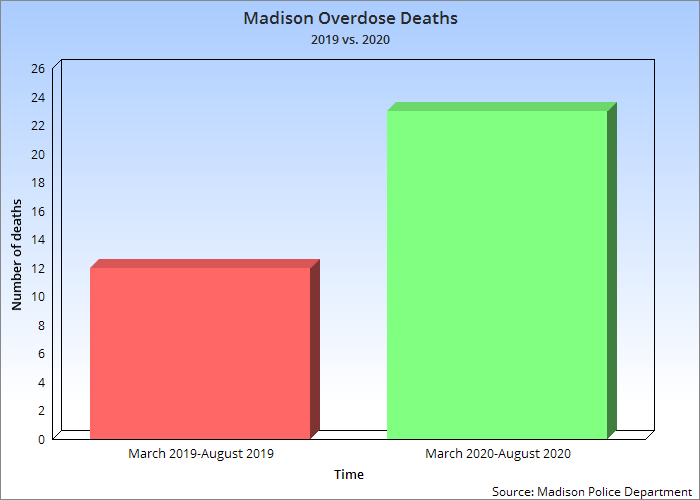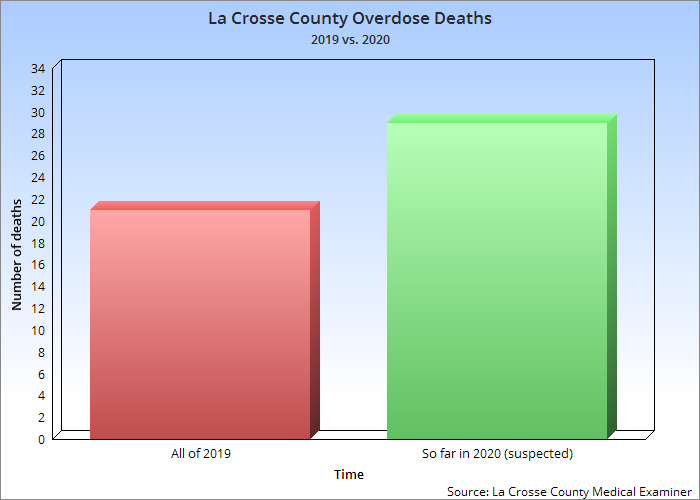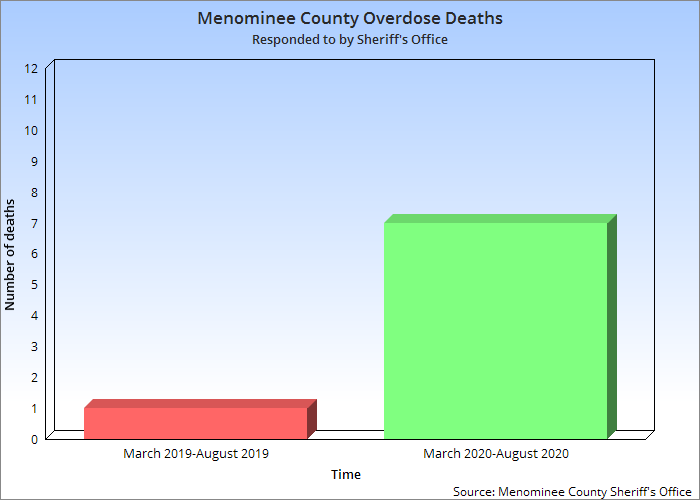MADISON, Wis. (SPECTRUM NEWS) - A viral pandemic and an opiate epidemic can create a deadly combination for Wisconsinites battling addiction.
Over the last few months, first responders are being called to more overdose emergencies, and more overdose deaths.
“Data for the first half of 2020, which is concurrent with the pandemic, shows a 40% rise year to year over last year,” said Dr. Michael Miller, a UW Health addiction psychiatrist and instructor at the Addiction Medicine Fellowship Program.

From the beginning of March to the end of July in 2019, 12 people died from overdoses in Madison. In 2020, in the middle of the shutdown, 23 Madisonians died during that same timeframe. Those numbers are from the Madison Police Department.

In La Crosse County, more people have died of suspected overdoses so far in 2020 than in all of 2019. Last year 21 people died of overdoses there. Chief Medical Examiner Tim Candahl said so far, they are investigating 29 suspected overdoses. They’re still waiting on toxicology results to confirm the causes of death.

In Menominee County, the Sheriff's Office responded to one overdose death from March 2019 to August 1, 2019. In 2020 during that time period, deputies have responded to seven overdose deaths.
“The shutdown says secure in place don't leave the house. And businesses shut down, so there’s nowhere to go,” Dr. Miller said. “All that people felt was the loneliness and emptiness and the boredom.”
“If somebody is very early in recovery, or hasn’t even begun, the coping skills are not very well-developed. Their go-to is just to go back to their drug so they get numbed out and don’t feel anything.”
Dr. Miller pointed out that far more people are addicted to alcohol than opioids. However, opioids tend to be much more deadly.
“We certainly have people relapsing and we have people coping with it just by getting high,” he said. “With something like opioids, that can be dangerous.”
Sobriety can be tougher under pandemic conditions that keep people from socializing and being physically together.
“Some people say the opposite of addiction isn't sobriety, it's connectedness,” Dr. Miller said. “Connectedness is really a big deal.”
A big part of recovery is building relationships with others who understand what it’s like, and can hold others accountable. In the clinical setting, a personal relationship with a provider can make someone’s recovery or relapse safer.
Dr. Miller said while connecting in-person may not be as easy, staying connected to recovery resources online is easier than ever.
“It’s amazing,” he said of addiction telemedicine. “You can do group therapy with a Zoom-type platform, even residential treatment uses that approach now … they all link up and they have a good two-hour group session. It really does work well.”
Even the self-help forms of addiction recovery can be done online. “AA and Narcotics Anonymous meetings are by Zoom now, and have big participation,” Dr. Miller said.
There are recovery resources without even leaving the house. “You should have hope, because there is help available.”
If you’re searching for addiction treatment, Dr. Miller recommends talking with your family doctor first. He said they tend to know which local programs have the best treatment options.
For more information on addiction and to find treatment providers, click here.



